News
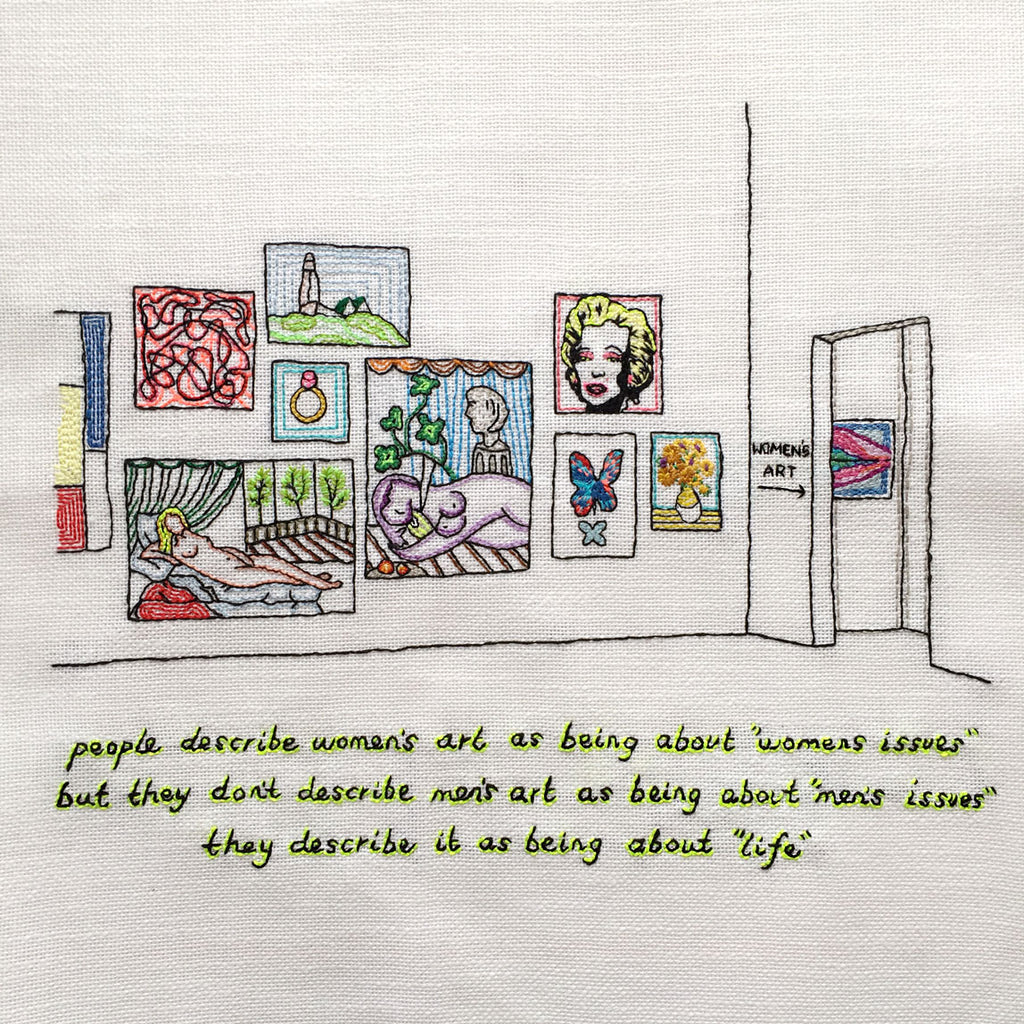
People describe women's art as being about "women's issues" (original embroidered art)

People describe women's art as being about "women's issues" but they don't describe men's art as being about "men's issues" they describe it as being about "life"
Hand embroidered piece.
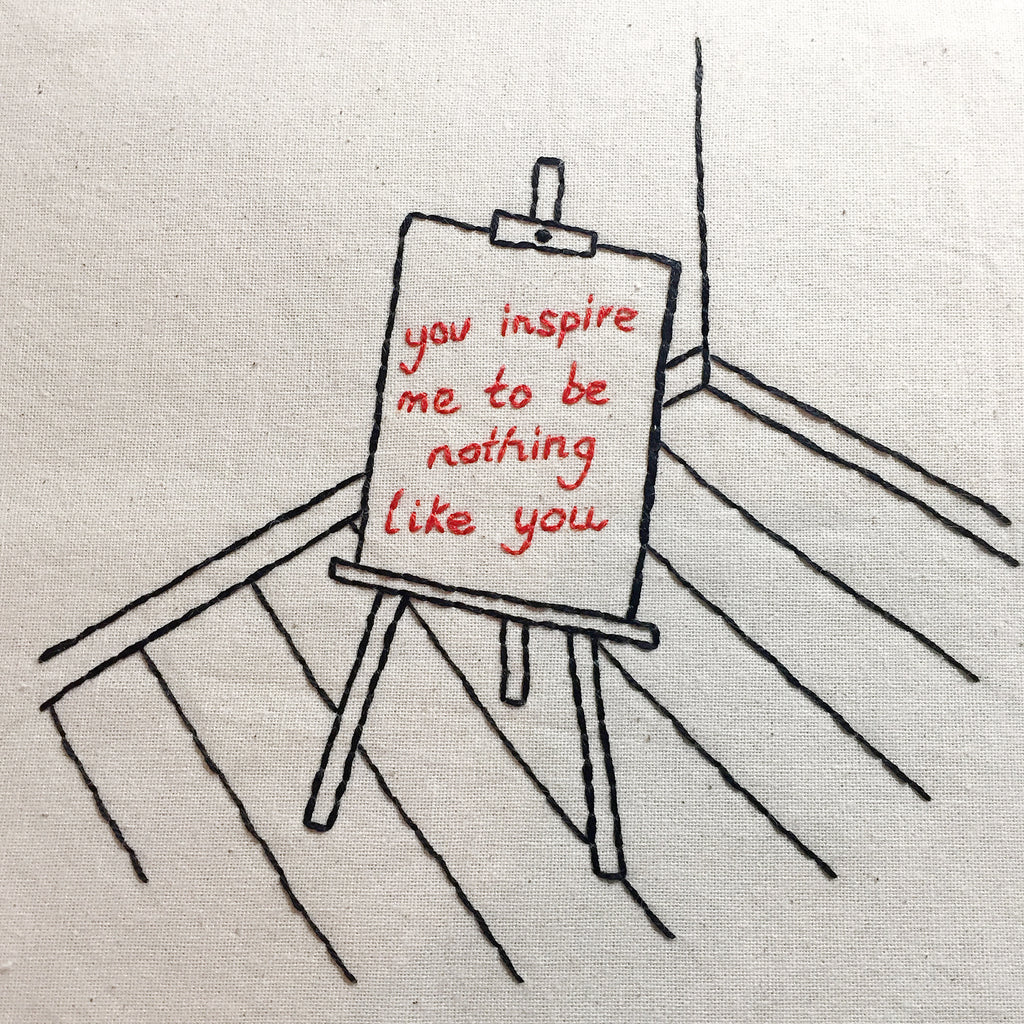
You inspire me to be nothing like you (original embroidered art)
"You Inspire Me To Be Nothing Like You" original, 2019, by Sophie King.
Sometimes you've got to take the negative effect people have on you and use it as a reminder of how not to be.

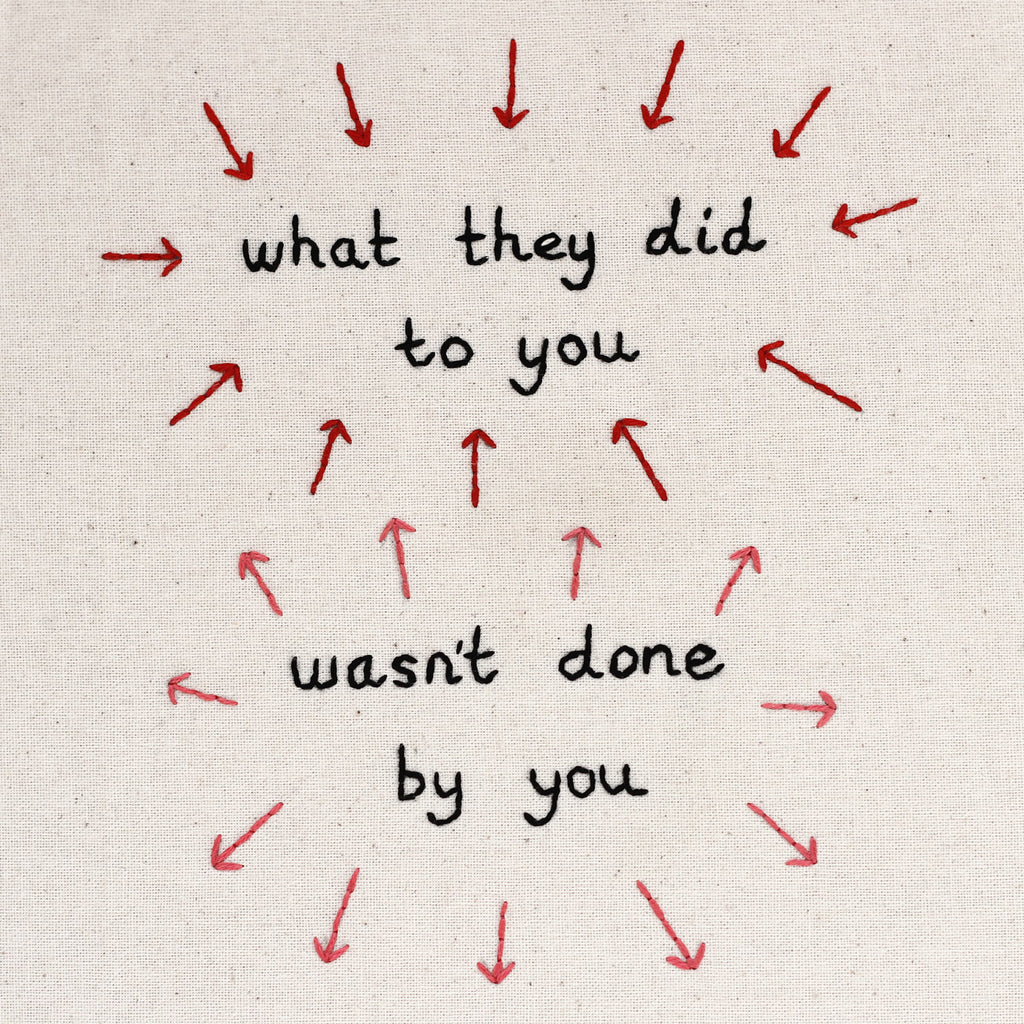
What they did to you wasn't done by you (original embroidered art)
"What they did to you, wasn't done by you" so stop tearing yourself apart.

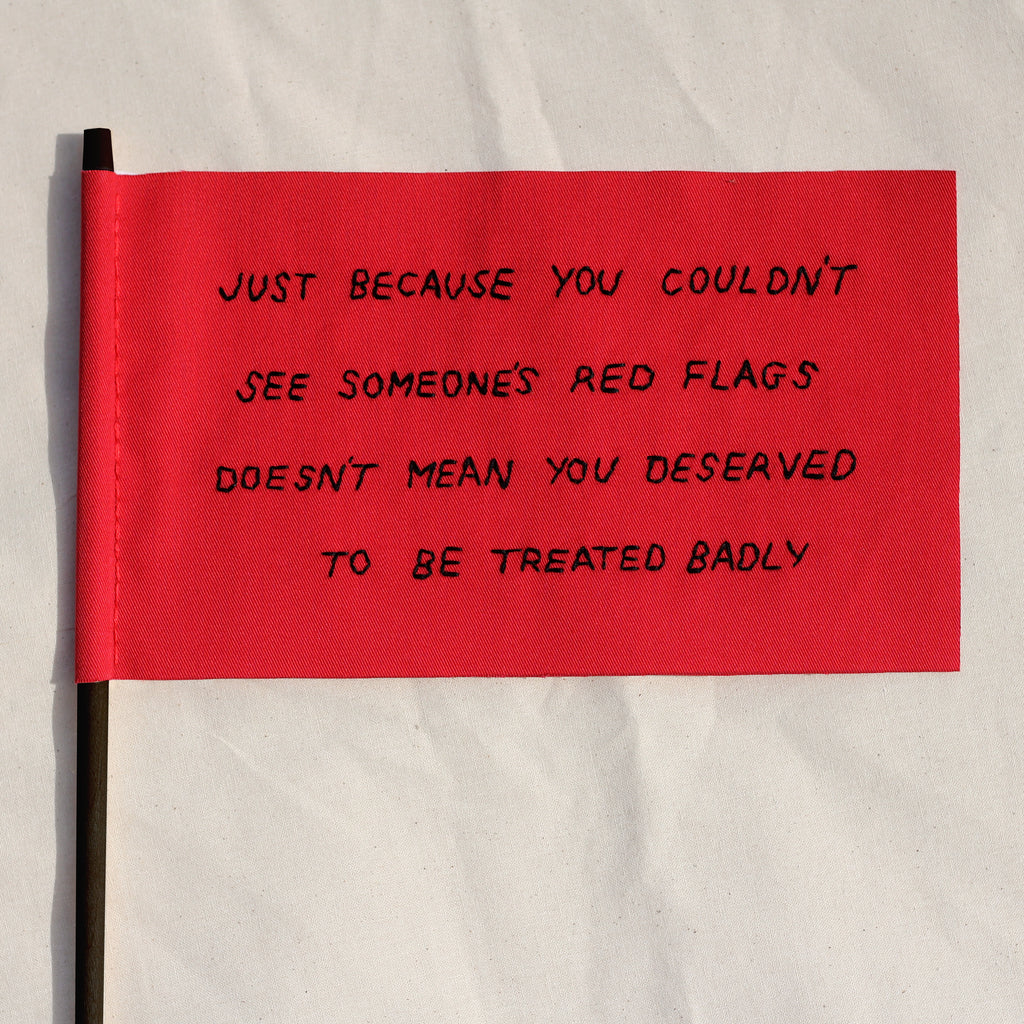
Why women "ignore" red flags - sophie king
Originally published on Medium, here.
Some people blame men mistreating women, on women “ignoring” red flags. People imply that the fault lies with women, for being too “gullible”, “naïve” and “stupid”:
“How couldn’t you see this coming?”, “you should have known better”, “how could you fall for his bullshit?”, “we all saw the red flags”, “the writing was on the wall!”.
However, the reality of why women “ignore” red flags, is a lot more complex than because they’re “stupid”. Society conditions us (especially women), to excuse, justify and minimise men’s bad behaviour. You can’t blame women for failing to “see” men’s red flags, when they’re continuously sent the message they’re green ones.
On top of being taught by society to romanticise and normalise men’s “red flags”, men manipulate them too. Women don’t “fall” for men’s bullshit, men lead them on through lies and gaslighting, they take advantage of their feelings to emotionally manipulate them. When you’re experiencing such manipulation first-hand, it’s very hard to see “red flags” from an outsider’s perspective.
Also, if you have feelings for someone, naturally you’re going to want to give them the benefit of the doubt. In fact, we’re taught that in order to have a healthy relationship, we have to trust our partner and believe the best in them. However, when we do exactly that but they turn out bad, suddenly blame is shifted onto us. Now we’re “too trusting” and “delusional”.
However, it’s seen as a negative trait within women to be wary of men. You can’t win: wrong to trust men, wrong not to.
Trusting = stupid, distrustful = cynical and bitter. It’s confusing being a woman, we’re sent mixed messages:
“Men change when they find the right woman” becomes “I can’t believe you thought he’d change”. “Be forgiving!” becomes “what a doormat”. “Don’t hold people’s past against them” becomes “it was obvious they were a bad person”.
How can you blame women for not recognising red flags, when they’re not taught how? When society misleads us by normalising and romanticising toxic traits in men? The truth is, people hate women. They see women being fooled by men, by no fault of their own, as an excuse to degrade them and dismiss them as “stupid”.
The victim-blaming of women, perpetuates the problem further. If women feel “stupid”, it makes them doubt their own perceptions and ability to discern red flags. If women blame themselves for how men mistreat them — that there’s something inherently wrong with them that caused it, they won’t believe they deserve better.
If people actually cared about women, they wouldn’t treat them with contempt, they’d educate them about red flags, they’d empower them to trust themselves and their gut instincts. Instead, women’s feelings are invalidated, they’re told they’re “overthinking”, “overreacting”, “too sensitive”, “paranoid”, “crazy”.
It’s ingrained in women to self-blame when they’re fooled: “how couldn’t I see this coming?”, “I’m an idiot!”, “I shouldn’t have trusted them”. However, hindsight is 20/20. Beating yourself up over what others did to you, changes nothing because you’re not the issue and never was. Even if you were “naïve”, so what! They’re even more in the wrong for taking advantage of that.
I’m not saying don’t learn about red flags, I’m saying no matter how hard we try to see red flags, it’s still the perpetrators fault regardless. You should never be motivated to work on your expectations and boundaries based on shame and fear. Women can’t be expected to predict men’s behaviour, to be clairvoyant, mind-reading. To be FBI agents on high alert for red flags 24/7. That’s not a way to live!
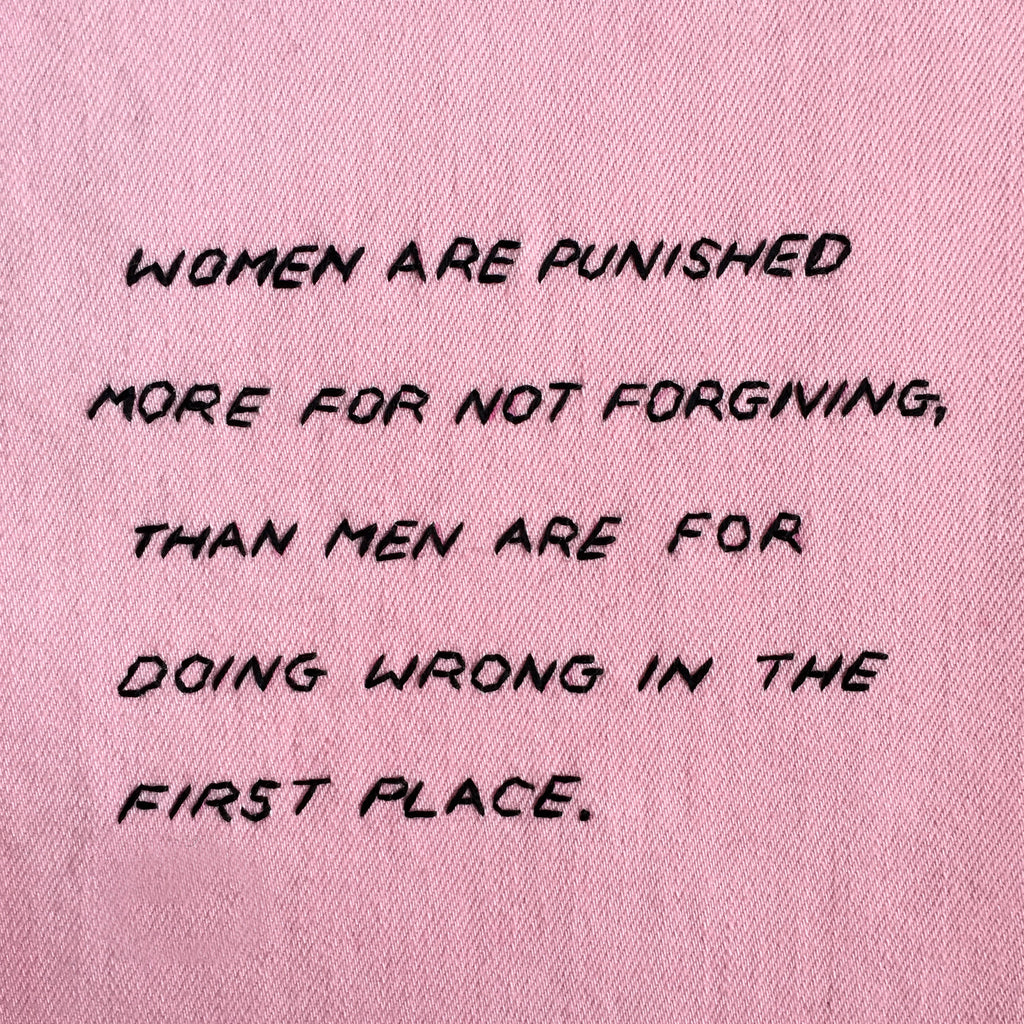
How the concept of forgiveness is used to gaslight women - sophie king
I’m not against the concept of forgiveness, I’ve chosen to forgive people countless times. However, what I’m definitely against, is pressuring people to forgive and shaming them if they don’t. I’ve found there’s a lot of stigma attached to those who choose not to forgive, especially if you’re a woman.
Women that don’t forgive, are assumed to be “scorned”, “bitter and twisted”. The stereotypes that surround “unforgiving” women, are used to gaslight them.
When women express that they’re upset or angry (and justifiably so), as a result of being hurt, people dismiss them as “bitter” and the validity of their feelings and experiences are questioned.
She isn’t psychologically traumatised because she’s been wronged, she’s just a “scorned woman”, “got an axe to grind”, “holding a grudge” and “unable to move on”. The fault lies with her, not the perpetrator because she won’t “let it go” and “get over it”. She’s not the victim, she’s bringing it on herself by not forgiving. The blame is shifted from the wrongdoer to the victim.
People assert she isn’t understandably angry and hurt, she’s “overreacting”, “irrational”, “crazy”, “psycho”, “too sensitive”. She’s “making something out of nothing”, she’s being “petty”, “creating drama”. She doesn’t want justice, she’s “out for revenge”.
Labelling a woman “bitter”, is like calling them “crazy”, it’s just another way to dismiss their feelings and whatever has happened to them as “all in her head”. Her feelings and experiences are just irrational and paranoid delusions of a “bitter” and “crazy” woman, not the reality of how women are mistreated every day all over the world.
Men often use the status of an unforgiving woman, to avoid accountability for their actions by disregarding whatever women accuse them of, by saying they’re “just bitter”. What he did was wrong but she’s worse for not being the better person and forgiving him.
No one wants the reputation of being a “bitter” woman, so this manipulates women into keeping silent and the perpetrator remains protected and their behaviour remains unchallenged.
In the past, when I’ve chosen to forgive and I’ve chosen not to, in both instances it was for my own benefit, on my own terms and my personal choice. Contrary to popular belief, I didn’t end up a bitter and twisted woman for the times I didn’t forgive. In fact, I found it empowered me to draw the line, my line of what I deem forgivable, to protect myself. I don’t owe anyone forgiveness and I won’t be shamed if I don’t forgive. Instead of telling someone they should forgive, tell the perpetrator not to do unforgivable things. Instead of assuming women that don’t forgive are scorned, listen to them.

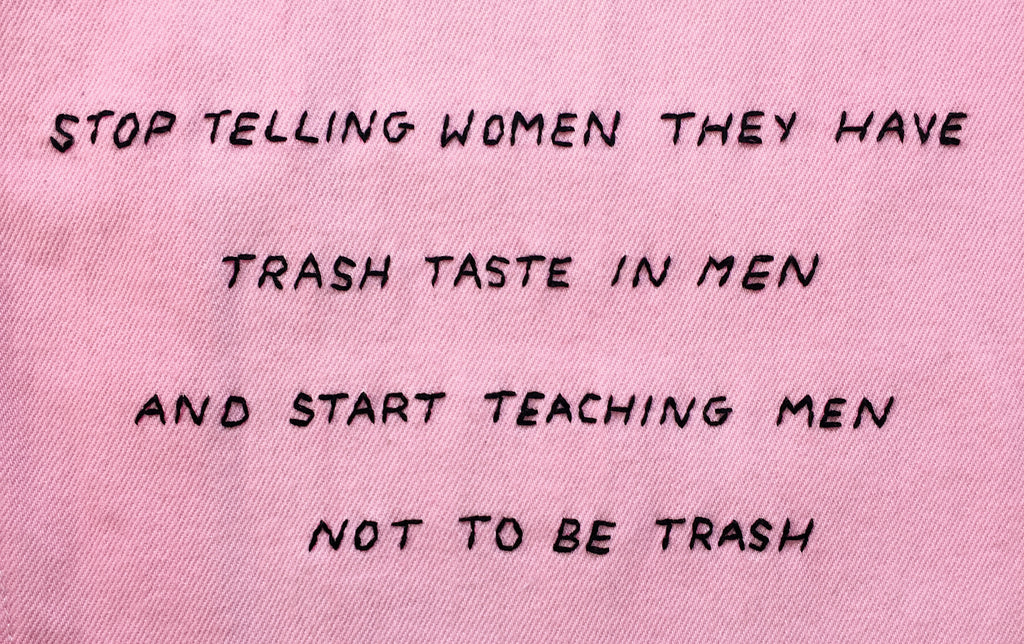
Why any woman can end up in a toxic relationship
"Why any woman can end up in a toxic relationship"
Originally published on Medium, here.
We’ve all heard the stereotypes, that only a certain kind of woman ends up in a toxic relationship. She must just have “daddy issues”, “trash taste in men”, “low self-esteem”, “no standards”, be a “masochist”, “love the drama/attention”, “be insecure”, “stupid”, “weak” and the list goes on.
People go to great lengths to find faults in women that they believe cause men to mistreat them. The victim blaming is insidious, as reflected in the kind of things people say to and about women who have been in toxic relationships with men;
“What an idiot!”, “how couldn’t she have seen this coming?”, “she knew this would happen”, “why does she always go for such men?”, “why does she stay with him?”, “she attracts such men”, “she’ll never learn”, “why does she allow men to treat her this way?”
The truth is, women aren’t to blame (not even partially), if men decide to treat them badly. Your “daddy issues”, “lack of boundaries”, “naivety”, or whatever other excuses people use to shift blame, aren’t to blame. Please believe me when I say there isn’t something inherently wrong with you that “provokes” or “attracts” such men into your life.
Do you know how I know this? Because women with healthy relationships with their dad, who are wise, strong, confident, intelligent and so on, can all end up in toxic relationships. Which should tell you, men will treat you badly regardless of how “good” you are.
The narrative that only a particular kind of woman ends up in a toxic relationship and that it’s all her fault, is a damaging lie. It falsely teaches women that they can avoid being mistreated by men, if only they’re “good enough” and that only lesser women, women with “issues”, are mistreated because they “allow it”.
Women don’t expect to find themselves in a toxic relationship because they believe they don’t fit the stereotype, so when they are, they feel ashamed because they’ve been taught they’re “better” than that; only stupid and weak women get mistreated by men.
When women experience toxic relationships with men, it becomes a part of their identity. She’s labelled a doormat, stupid and weak, it becomes a mark against her, not the actual man that treats her poorly. Women are judged harder for being mistreated, than the actual men who mistreat them.
Victim-blaming taught me I wasn’t worthy of a healthy type of love or relationship, those were rewards for women without “issues”, women who had something that I didn’t have, that made men treat them with care and respect. I believed there was something was inherently wrong with me that was causing men to mistreat me.
Blaming women for how men have chosen to mistreat them is so normalised, that I wasted years carrying a lot of shame and self-hatred. Shame did nothing to empower me, heal me or prevent me from entering more toxic relationships. Victim-blaming doesn’t work because victims aren’t the cause of the problem.
If there’s something I wish women could know, is that when men mistreat you, it has nothing to do with you. They’re either a dickhead or they’re not, you can’t make them treat you better. It’s always their decision. The blame, shame and guilt you feel, is a lie, that you’ve been taught to believe. Instead of asking women why they “allow” themselves to be mistreated by men, we need to question why men think it’s acceptable to do so in the first place.

Embroidery In-store Pop Up Event For Waxflower Bridal


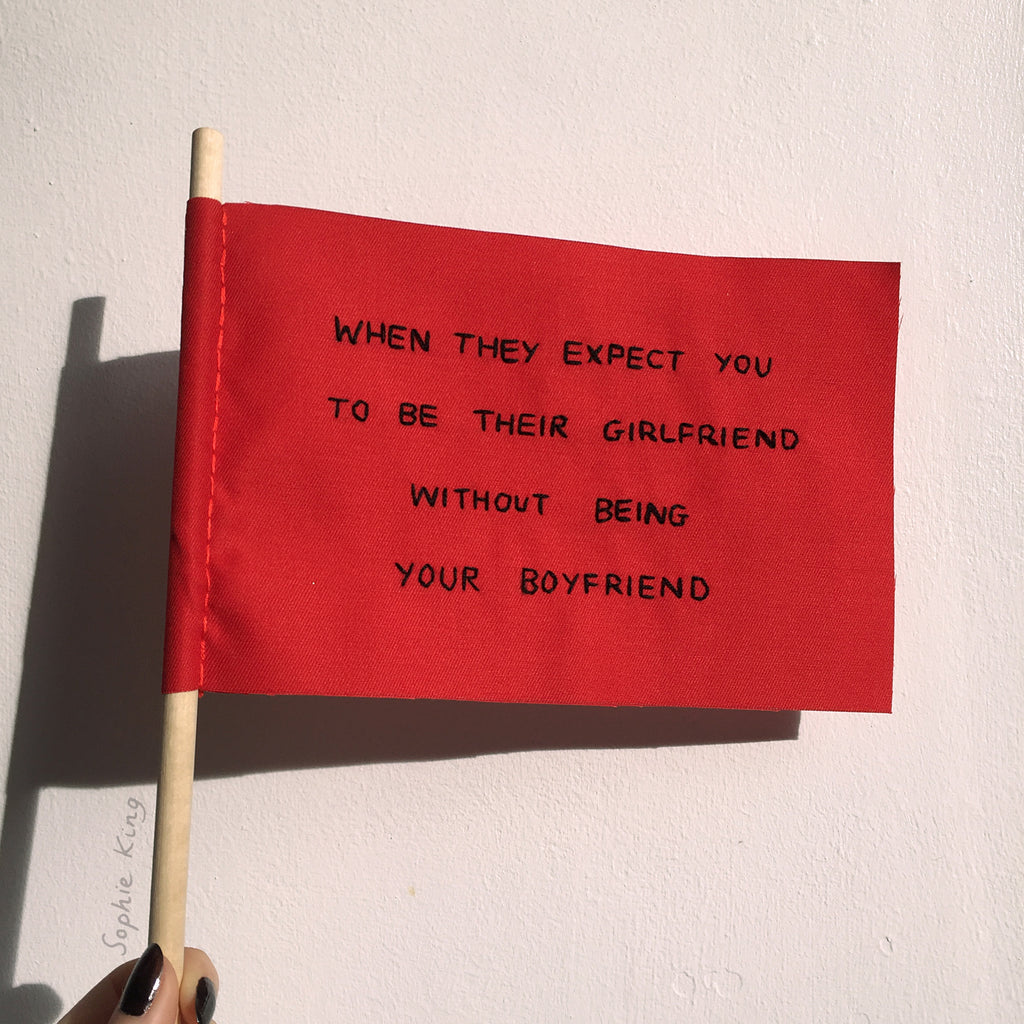
Series of embroidered textile "red flags"
This is my ongoing series of "red flags" I've been making over the last year or so about dating, relationships and people in general. This series is inspired in part by the cultural pressure placed on women to be clairvoyants when it comes to men's intentions. Society often blames women for not predicting men's behaviour, as opposed to blaming men for mistreating women in the first place. This encourages women to internalise blame and feel ashamed for not "seeing" the red flags. These red flags are about some of the things I've learnt:
"Just because you couldn't see someone's red flags doesn't mean you deserved to be treated badly"

"When they expect you to be their girlfriend, without being your boyfriend"

"they only want you when they can't have you"

"When acquaintances love them but people who know them hate them"

"When people derail conversations about social issues because they're not about them"

"When they refer to women as females"

"When they think compassion and emotional intelligence are signs of weakness"

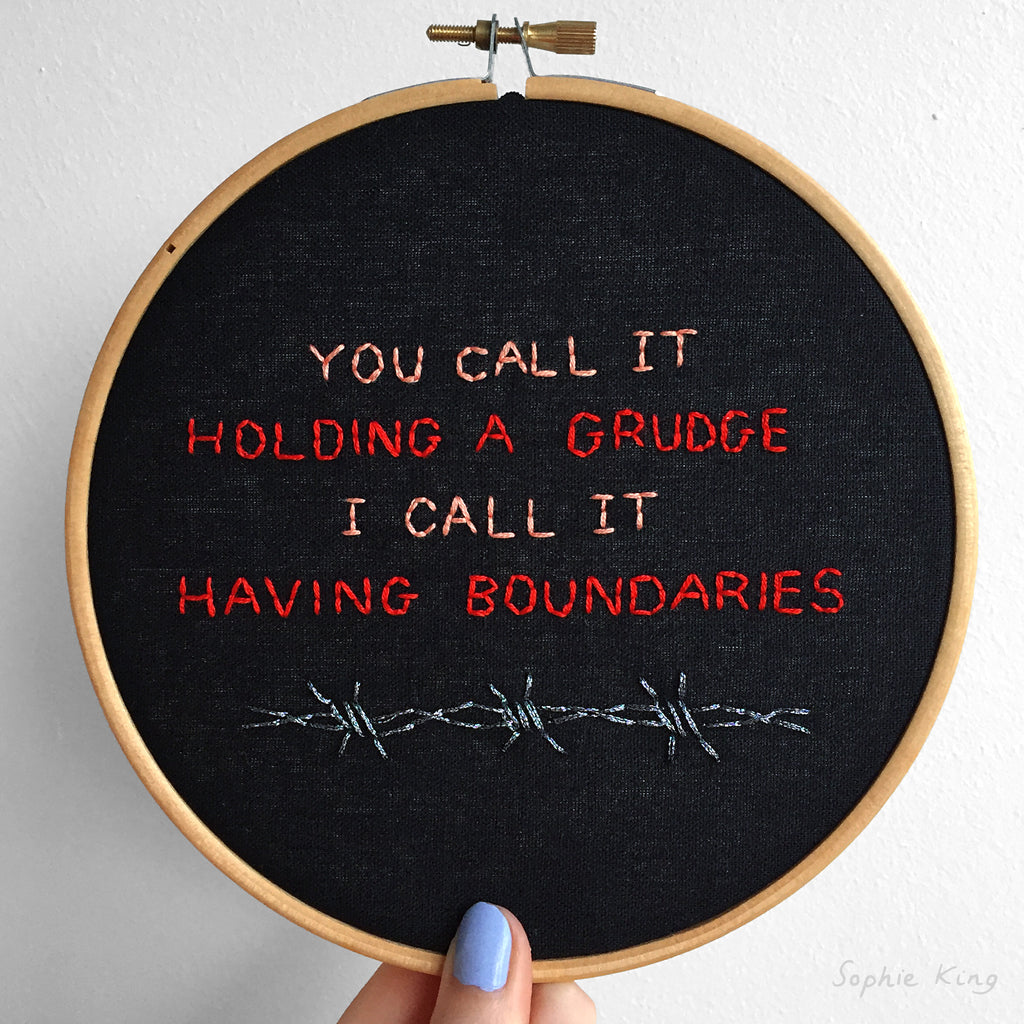
You call it holding a grudge, I call it having boundaries
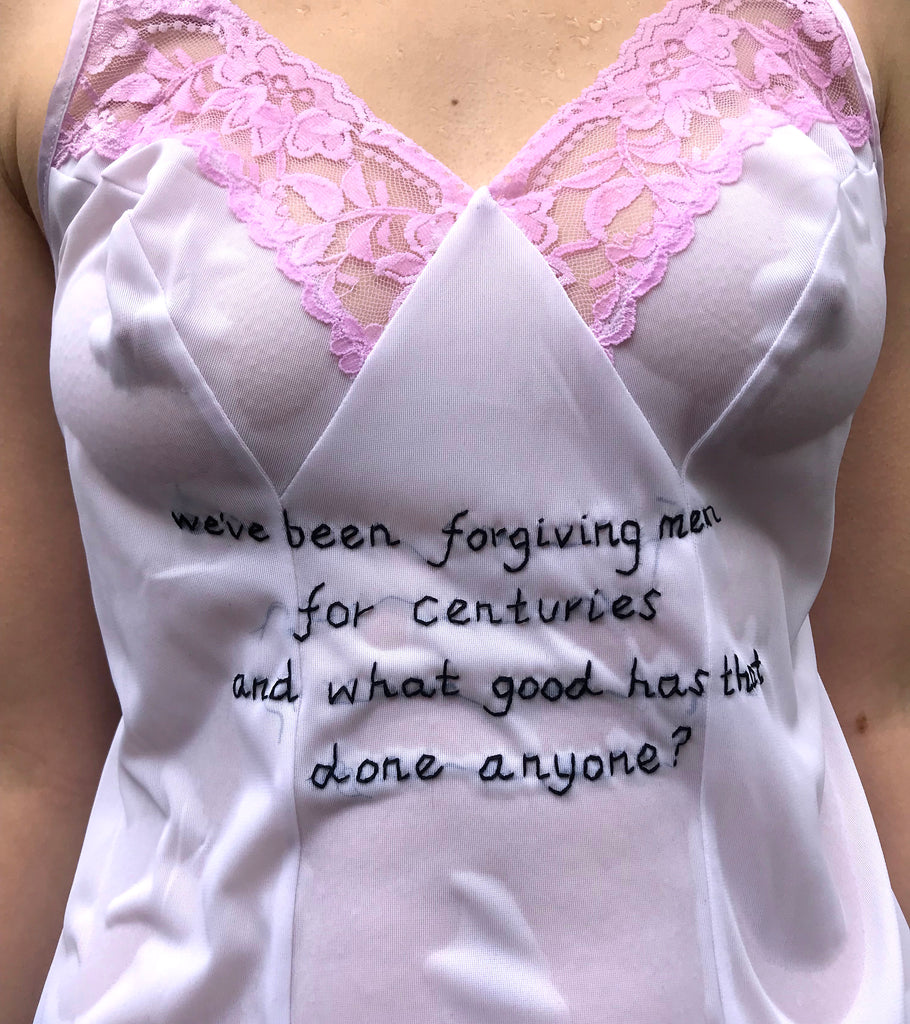
We've been forgiving men for centuries and what good has that done anyone?
Hand embroidery on nightgown.

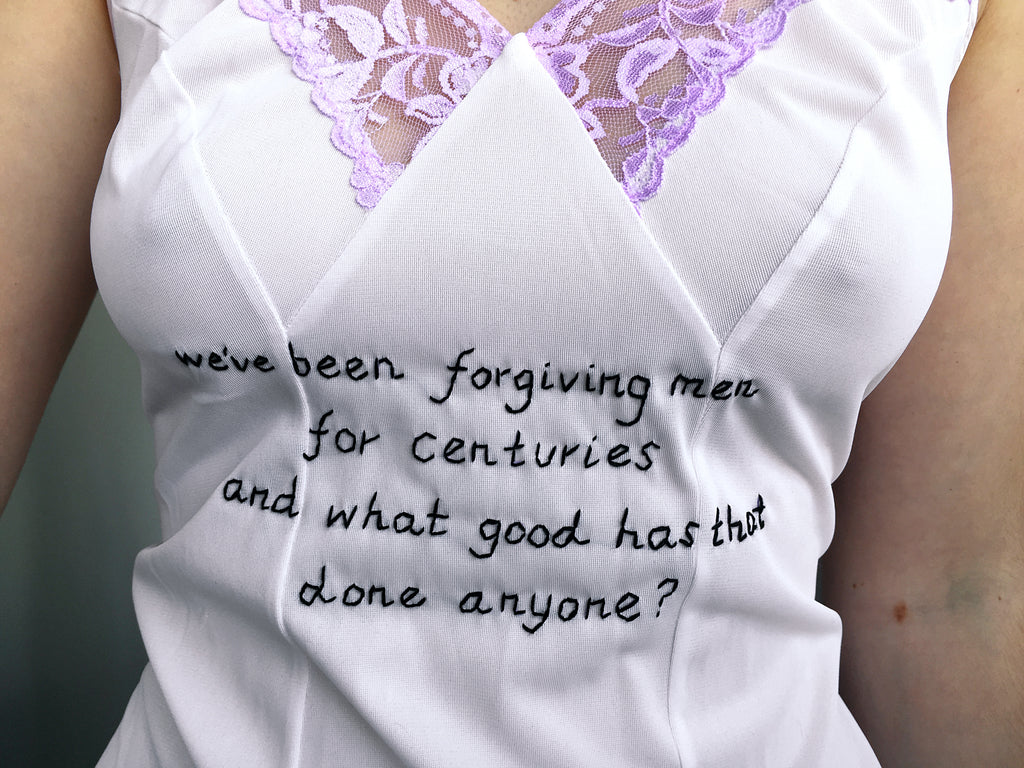
How the concept of forgiveness perpetuates a culture where men aren't held accountable for their actions
I’m not anti-forgiveness but I’ve often been on the receiving end of men using forgiveness as a tool to avoid accountability for doing wrong. I’ve been guilt tripped and manipulated to “get over” what they’d done, under the guise of “forgiving” them. They twist seemingly harmless popular wisdom “I’m only human, we all make mistakes” into excuses.
Popular wisdom tells us that “forgiveness is for you, not them, it’s not about condoning what they did wrong”. Which might be true in some cases but in my experience, the concept of forgiveness is often weaponised to excuse the perpetrator’s actions, at the expense of the victims healing and justice. Especially when the perpetrator is male and when the victim is female or from another oppressed group.
People put the onus on women to forgive men for mistreating them, whilst normalising what they’d done wrong in the same breath, by making excuses, justifications and minimisations.
“Give them a second chance… they’re only human/ we all make mistakes/ no one’s perfect.”
I have an issue when forgiveness is used in this way, when excuses are attached to it. When we’re told to forgive and sent the message that how they’d mistreated us was acceptable. It teaches perpetrator’s that they’re not fully responsible for their actions, that they can demand forgiveness and can just dismiss what they’ve done. In this context, the concept of forgiveness perpetuates a culture where men don’t take accountability for their actions.
When people say things like “everyone makes mistakes. If you can’t forgive others, don’t expect other to forgive you”, they’re trying to deflect blame by counter-accusing others of making “mistakes” too. It’s a threat to victims to think twice before they speak out.
It’s weaponising forgiveness, it’s saying we’re obliged to forgive others because we’re all guilty of making “mistakes” too, that we’re no better than them, so we better “let it go” or face punishment too.
When people say things like “we all make mistakes, forgive them”, they’re using forgiveness as a form of manipulation, to excuse and counter-attack, so we “go easy” on the perpetrator, sympathise with them and pressure victims into keeping quiet.
Men be like: I know I ruined the lives of countless women, wasn’t sorry until I was found out but everyone make’s mistakes… give me a second chance.
People also pull the “but everyone does it” card, to excuse their wrongdoings. That everyone makes the same “mistakes” as them, so it’s ok. Which is easier than taking individual responsibility for their personal choices.
Another excuse people make, is that “no one is perfect”, which is a common counter-attack placed on victims. And they’re right, “no one is perfect” but is that a reason to excuse our wrongdoings? No. Does that mean we don’t have to take accountability for our actions? No. Does that mean we’re entitled to be forgiven? No.
People also use the fact we’re “only human” to minimise personal responsibility for their wrongdoings. They’re not in control of their actions, their biology is. They try to normalise their behaviour as “just the way people are”. Being human is not an excuse to remove accountability from people’s actions and normalise bad behaviour.
The problem is people use excuses like “we’re only human, we all make mistakes, no one’s perfect” to minimise things like sexual assault, cheating and so on. Stop teaching people that such things are justified, that’s how people give themselves permission to do it in the first place. It might be the norm (currently) to do such things but that doesn’t make it ok.
Why do we use the “people can change, everyone deserves a second chance” argument to persuade women into forgiving men for mistreating them but in every other area of our life, we would never apply this type of logic?
If a mechanic had a history of scamming customers, would we just say “people change, give them a second chance”, to encourage people into trusting them with their car? Doubt it, unless we had an ulterior motive.
So why are people so quick to tell women to forgive men for hurting them? The “people can change” narrative seems to specifically serve men who’ve mistreated women.
For example, the “people can change, everyone deserves a second chance” narrative, is used to deflect blame onto women. When women give men “a second chance” but said men wrong them, the woman is blamed because “what did they expect”. Women are blamed for “giving a second chance” to shady men, instead of blaming men for being shady.
Saying “everyone make’s mistakes, they’re only human, no one’s perfect… forgive them”, to victims is adding insult to injury. Not only are you minimising what the perpetrator did to them, you’re invalidating their feelings by implying it wasn’t “that bad”.
We've been forgiving men for centuries and what good has that done anyone? If forgiveness as a concept challenged the status quo, do you really think those in power would be telling oppressed groups they have to do it?
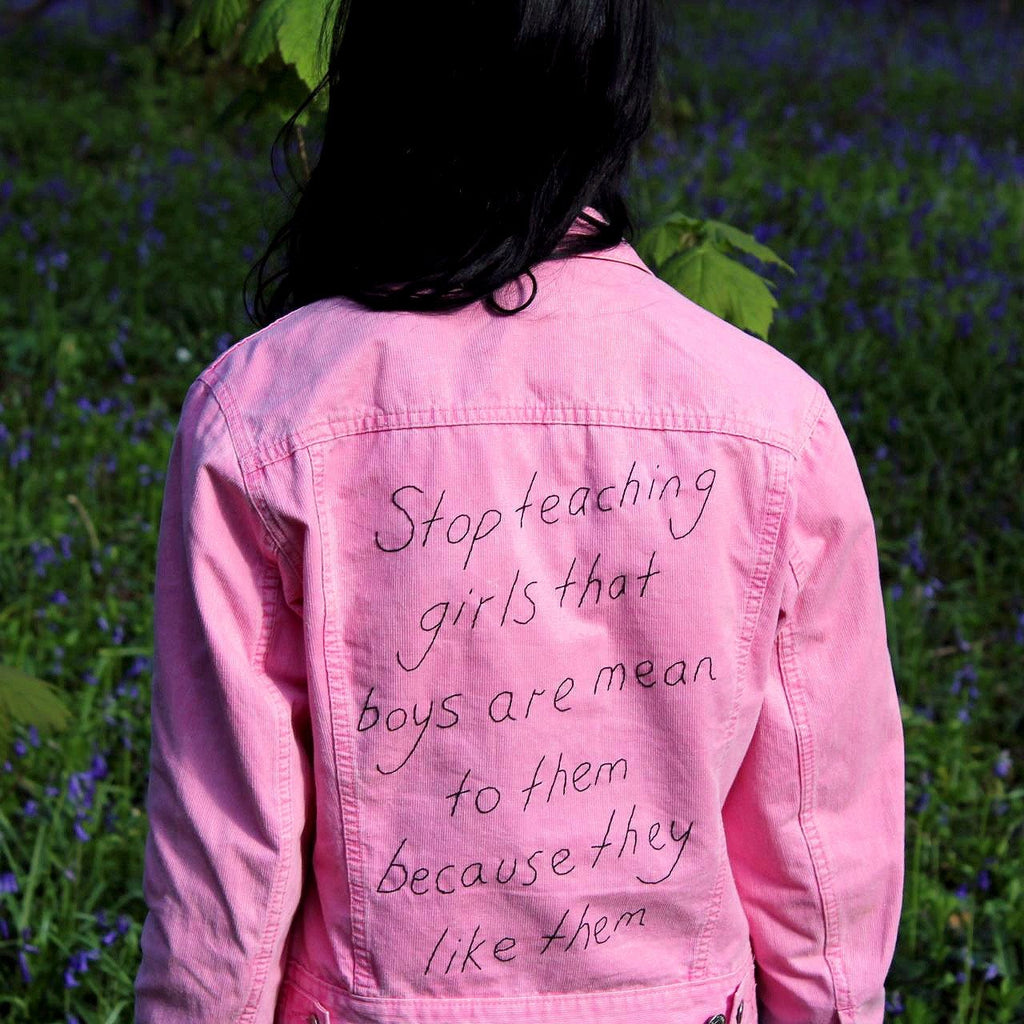
Common criticisms of my "Stop Teaching Girls That Boys Are Mean To Them Because They Like Them" embroidery


